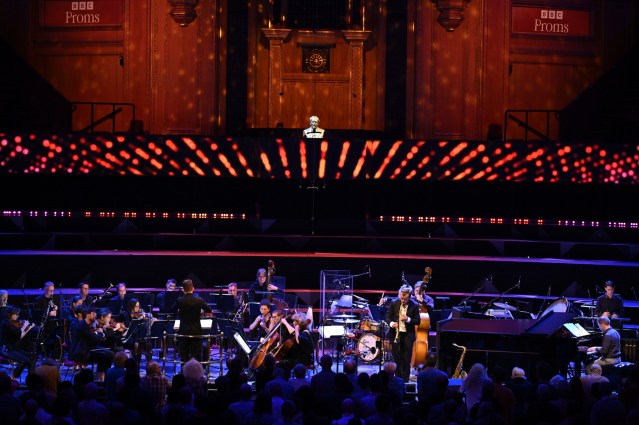Marius Neset/ London Sinfonietta / Geoffrey Paterson – Geyser
(Royal Albert Hall – Proms 2022, Saturday 3 September. Live review by Rob Mallows)

Out of pain, comes beauty.
Geyser – the new composition by Norwegian saxophonist Marius Neset – was first written as a response to the emotional impact of the pandemic.
It was Neset’s attempt to capture the joy of playing and the outburst of creative energy that erupts, fountain-like, when musicians perform on stage, something which he and others had not been able to do the previous two years.
Not yet a subscriber of our Wednesday Breakfast Headlines?
Join the mailing list for a weekly roundup of Jazz News.
Then, the war in Ukraine happened.
Neset writes in the accompanying notes that as a composer he felt compelled to rewrite what he’d completed to better reflect the shock and pain of the conflict, generating as a result a musical tour-de-force which over around 65 minutes and eight compelling movements took the Royal Albert Hall audience from darkness and despair to a place of optimism.

I’m more familiar with Neset’s playing in conventional line-ups, either his own Quintet, excelling on Morten Schantz Godspeed or with the ‘noughties jazz-pop of Jazz Kamikaze, through which he first built his reputation as one of Europe’s most exciting sax players and composers.
Late Saturday night, playing with the London Sinfonietta, Neset further cemented his place among the elite of European jazz through bringing together improvised and composed music in such an exciting way.
Stage right, the Sinfonietta, ably conducted by Geoffrey Paterson. Stage left, his quintet, all familiar names on the London jazz scene: Ivo Neame on piano, Jim Hart on vibraphone and percussion, Conor Chaplin on double bass, and Anton Eger on drums.
(Eger, incidentally – sporting a mane of bleached blonde hair redolent of Doc Brown from the Back to the Future franchise, flowing majestically in time with each cymbal crash – was dressed in tie, blazer, badge and pocket square for the show. He made for a compelling figure behind the plexi-glass screens as, through the course of the evening, his drumming increased in intensity, requiring the blazer to be discarded half way through.)
Centre stage stood Neset, bridging the two worlds.

With an expanded palette to play with, and the world’s most famous concert hall to fill, Neset ran riot in a spellbinding performance that ran the gamut of musical emotions and secured energetic applause and hollering, and three curtain calls, from a third-full but enraptured Royal Albert Hall audience (this being a Proms Late, it finished around 1125h, prompting a rush for the last trains home).
And what of the music?
It opened with stark, staccato strings and emotionally charged chord choices from orchestra and band, reflecting the darker tones Neset added to his original composition in response to Putin’s war.
As these themes developed – reflecting something of a cinematic score feel at times – Neset’s interjections on soprano and tenor saxophone and Neame and Hart’s discordant, stuttered chords, plus competing time signatures, created an unsettling sense of chaos. As orchestra and band upped the intensity in the early movements, Neset hunched down centre stage – head bowed, arms resting in front of his knees, almost in supplication – redolent of a man in intense pain, experiencing the musical sturm und drang being played out behind him.
But then there came a reset, as the tone of the music changed and looked upwards. The epic runs and sustained upper register sounds from Neset’s sax made the most of the massive space available and soared and swooped as he explored themes of redemption and rebirth on the back of brighter tonal choices.
Towards the end, like the eponymous Geyser, the players, having absorbed the build up of pressure from what had gone before, exploded on stage in a musical release of tension and joy which offered an uplifting end to a composition that rounded all the emotional bases before heading to home.
Neset’s quintet and the London Sinfonietta meshed seamlessly, each playing to their strengths, creating a musical pairing that embodied the old but nevertheless valuable cliché that the whole was something more than just the sum of its parts. For Neset (this was his third collaboration with the Sinfonietta), it is a chance to expand and explore, test himself, bring his increasingly recognised compositional skills into play, and to react expansively and exhilaratingly to the world around him.
With Geyser, Neset has mined a musical mother lode of ideas, and you could see at the end that the exhaustion from doing so. The countless hours of composition, of re-considering and rethinking, of rehearsing and refining had all been worth it.

Geyser was commissioned by the BBC Proms
LINK: Prom 63 is available to listen on BBC Sounds for the next year
Categories: Live reviews











A huge thank you to the eagle-eyed reader from KT2 who reminded us that stage directions such as “stage left” and “stage right” are always written from the perspective of actors/performers facing the audience. This has been changed in the text.